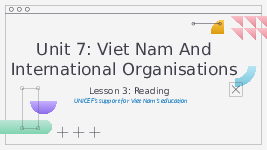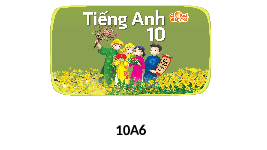















































Preview text:
Unit U 8 1 NE FAMIL W WA Y YS TO LEARN ni LFE t
LESSON 1 GETTING STARTED New learning activities Un Oit BJ 1 E F C am TI F V A ily M Li ES IL fe Y LIFE 1. Knowledge
Be aware of the new learning activities and their importance
Expand vocabulary of the topic 'New learning activities' and practice them
Get to know the language aspect: relative pronouns
Read and listen for specific information in the task 'True or False' 2. Skills
Develop listening and reading skil s
Be col aborative and supportive in pair work and teamwork 3. Attitude
Familiarize with new learning activities Develop self-study skil s Table of contents 01 02 03 04 Warm-up Presentation Practice Consolidation 01 Warm-up Game “Name some Learning Activities” Pairwork Group work Debate L ? EA?? RNING ACTIVITIES Experiment Project Presentation PRE-LISTENING Vocabulary group work /ˈɡruːp wɜːk/ pairwork /peə(r) wɜːk/ làm việc theo nhóm làm việc theo đôi PRE-LISTENING Vocabulary
presentation /ˌpreznˈteɪʃn/ debate /dɪˈbeɪt/ bài thuyết trình Tranh luận PRE-LISTENING Vocabulary project /ˈprɒdʒekt/ experiment /ɪkˈsperɪmənt/ dự án thí nghiệm JERRY’S DOOR START What is this? CHECK debate What is this? CHECK experiment What is this? CHECK project What is this? CHECK pairwork What is this? CHECK Group work What is this? CHECK presentation
Có đủ bộ word và powerpoint cả năm tất cả các bài
môn: Anh 10 global success
https://tailieugiaovien.edu.vn/lesson/powerpoint-anh-1
0-global-success-ket-noi-tri-thuc/ 02 Presentation PRESENTATION
***Vocabulary game: WHO IS FASTER? - Team A & B: 6 verbs - 6 phrases on the board
- Each team: go to the board, stick your cards to form a correct phrase. PRESENTATION 1. ... u ...... plo ... ad a video PRESENTATION 2. .... ..... fin .. d . information
~ search for information PRESENTATION 3. .... di .. s ...... a to cuss pic PRESENTATION 4. ......... ta ... ke notes PRESENTATION 5. ...... pre ... p .. a . re materials PRESENTATION 6. ........ d .. o .. a project PRESENTATION Vocabulary 1. upload a video đăng tải video
2. find/search for information tìm thông tin 3. discuss a topic
thảo luận về một đề tài 4. take notes ghi chép 5. prepare materials chuẩn bị tài liệu 6. do a project làm dự án 03 Practice
Có đủ bộ word và powerpoint cả năm tất cả các bài
môn: Anh 10 global success
https://tailieugiaovien.edu.vn/lesson/powerpoint-anh-1
0-global-success-ket-noi-tri-thuc/ PRACTICE
New learning activities (page 86)
1 Listen and read. Long: Hi, Nick. What are you doing?
Nick: I’m watching the video that my geography teacher uploaded on Eclass.
Long: Real y? What is it about?
Nick: It’s about global warming. My teacher asked us to watch the video and find more information about this topic.
Long: So, is watching the video part of your homework?
Nick: Yes, then next week, we’l work in groups and discuss the topic in class.
Long: Sounds interesting. You can watch the video many times and also search for more information at home.
Nick: You’re right. I’m not good at taking notes in class, you know. So I prefer this way of
learning. It gives me a chance to discuss with my classmates, who may have original ideas on the topic.
Long: Does your teacher often ask you to prepare materials at home and discuss in class, Nick?
Nick: Yes, she does. We’re doing a lot of projects that help us understand the lessons better.
This way of studying, which gives us more control over our own learning, is quite useful.
Long: You’re lucky. My teachers use very traditional methods of teaching at my schools. I
wish I could try these new learning activities. What are Long and Nick talking about??? PRACTICE 1 Listen and read.
New learning activities (page 86)
Long: Hi, Nick. What are you doing?
Nick: I’m watching the video that my geography teacher uploaded on Eclass.
Long: Real y? What is it about?
Nick: It’s about global warming. My teacher asked us to watch the video and find more information about this topic.
Long: So, is watching the video part of your homework?
Nick: Yes, then next week, we’l work in groups and discuss the topic in class.
Long: Sounds interesting. You can watch the video many times and also search for more information at home.
Nick: You’re right. I’m not good at taking notes in class, you know. So I prefer this way of
learning. It gives me a chance to discuss with my classmates, who may have original ideas on the topic.
Long: Does your teacher often ask you to prepare materials at home and discuss in class, Nick?
Nick: Yes, she does. We’re doing a lot of projects that help us understand the lessons better.
They are talking about:
This way of studying, which gives us more control over our own learning, is quite useful. - Nick's geography
Long: You’re lucky. My teachers use very traditional methods of teaching at my schools. I
wish I could try these new learning activities. homework about global warming. - their ways of learning: watching a video, working in groups, doing projects... PRACTICE
2 Read the conversation in pairs and tick () T (True) or F (False). (part 2, p.87) STATEMENT TRUE FALSE
1. Nick is preparing for his next geography class.
2. Nick’s note taking skills are quite good.
3. Nick’s class is working on many projects now. PRACTICE Match 4
steps to do 'TRUE or FALSE' task: STEP 1 ......???........ STEP 2 .......???......... STEP 3 .......???......... STEP 4 .......???.........
- Find SIMILAR WORDS in the text.
- Identify KEY WORDS (nouns, verbs, adjectives) in the statement.
- If the same --> True. If opposite --> False.
- Evaluate if KEY WORDS and SIMILAR WORDS are the same or opposite. PRACTICE Match 4
steps to do 'TRUE or FALSE' task: STEP 1 ......???........ STEP 2 .......???......... STEP 3 .......???......... STEP 4 .......???.........
- Find SIMILAR WORDS in the text.
- Identify KEY WORDS (nouns, verbs, adjectives) in the statement.
- If they are the same --> True. If they are opposite --> False.
- Evaluate if KEY WORDS and SIMILAR WORDS are the same or opposite. CORRECTION STATEMENT TRUE FALSE
1. Nick is preparing for his next geography class.
Long: Hi, Nick. What are you doing?
Nick: I’m watching the video that my geography teacher uploaded on Eclass.
Long: Real y? What is it about?
Nick: It’s about global warming. My teacher asked us to watch the video and find more information about this topic.
Long: So, is watching the video part of your homework?
Nick: Yes, then next week, we’l work in groups and discuss the topic in class.
Long: Sounds interesting. You can watch the video many times and also search for more information at home.
Nick: You’re right. I’m not good at taking notes in class, you know. So I prefer this way of learning. It gives me a chance to discuss with my
classmates, who may have original ideas on the topic.
Long: Does your teacher often ask you to prepare materials at home and discuss in class, Nick?
Nick: Yes, she does. We’re doing a lot of projects that help us understand the lessons better. This way of studying, which gives us more control
over our own learning, is quite useful.
Long: You’re lucky. My teachers use very traditional methods of teaching at my schools. I wish I could try these new learning activities. CORRECTION STATEMENT TRUE FALSE
2. Nick’s note taking skil s are qu nite o t good. d
Long: Hi, Nick. What are you doing?
Nick: I’m watching the video that my geography teacher uploaded on Eclass.
Long: Real y? What is it about?
Nick: It’s about global warming. My teacher asked us to watch the video and find more information about this topic.
Long: So, is watching the video part of your homework?
Nick: Yes, then next week, we’l work in groups and discuss the topic in class.
Long: Sounds interesting. You can watch the video many times and also search for more information at home.
Nick: You’re right. I’m not good at taking notes in class, you know. So I prefer this way of learning. It gives me a chance to discuss with my
classmates, who may have original ideas on the topic.
Long: Does your teacher often ask you to prepare materials at home and discuss in class, Nick?
Nick: Yes, she does. We’re doing a lot of projects that help us understand the lessons better. This way of studying, which gives us more control
over our own learning, is quite useful.
Long: You’re lucky. My teachers use very traditional methods of teaching at my schools. I wish I could try these new learning activities. CORRECTION STATEMENT TRUE FALSE
3. Nick’s class is working on many projects now.
Long: Hi, Nick. What are you doing?
Nick: I’m watching the video that my geography teacher uploaded on Eclass.
Long: Real y? What is it about?
Nick: It’s about global warming. My teacher asked us to watch the video and find more information about this topic.
Long: So, is watching the video part of your homework?
Nick: Yes, then next week, we’l work in groups and discuss the topic in class.
Long: Sounds interesting. You can watch the video many times and also search for more information at home.
Nick: You’re right. I’m not good at taking notes in class, you know. So I prefer this way of learning. It gives me a chance to discuss with my
classmates, who may have original ideas on the topic.
Long: Does your teacher often ask you to prepare materials at home and discuss in class, Nick?
Nick: Yes, she does. We’re doing a lot of projects that help us understand the lessons better. This way of studying, which gives us more control
over our own learning, is quite useful.
Long: You’re lucky. My teachers use very traditional methods of teaching at my schools. I wish I could try these new learning activities. PRACTICE
Complete the sentences with ONE word only. (part 4, page 87) 3
1. Nick is watching the video _______ his geography teacher uploaded on Eclass.
2. This way of learning gives him a chance to discuss with
his classmates, _______ may have original ideas on the topic.
3. They are doing a lot of projects _______ help them understand the lessons better.
4. That way of studying, _______ gives them more control
over their own learning, is quite useful. CORRECTION
1. Nick is watching the video _____t__ ha _ his ge t ography teacher uploaded on Eclass.
Long: Hi, Nick. What are you doing?
Nick: I’m watching the video that my geography teacher uploaded on Eclass.
Long: Real y? What is it about?
Nick: It’s about global warming. My teacher asked us to watch the video and find more information about this topic.
Long: So, is watching the video part of your homework?
Nick: Yes, then next week, we’l work in groups and discuss the topic in class.
Long: Sounds interesting. You can watch the video many times and also search for more information at home.
Nick: You’re right. I’m not good at taking notes in class, you know. So I prefer this way of learning. It gives me a chance to discuss with my
classmates, who may have original ideas on the topic.
Long: Does your teacher often ask you to prepare materials at home and discuss in class, Nick?
Nick: Yes, she does. We’re doing a lot of projects that help us understand the lessons better. This way of studying, which gives us more
control over our own learning, is quite useful.
Long: You’re lucky. My teachers use very traditional methods of teaching at my schools. I wish I could try these new learning activities. CORRECTION
2. This way of learning gives him a chance to discuss
with his classmates, _______ may h wha ove original ideas on the topic.
Long: Hi, Nick. What are you doing?
Nick: I’m watching the video that my geography teacher uploaded on Eclass.
Long: Real y? What is it about?
Nick: It’s about global warming. My teacher asked us to watch the video and find more information about this topic.
Long: So, is watching the video part of your homework?
Nick: Yes, then next week, we’l work in groups and discuss the topic in class.
Long: Sounds interesting. You can watch the video many times and also search for more information at home.
Nick: You’re right. I’m not good at taking notes in class, you know. So I prefer this way of learning. It gives me a chance to discuss with my
classmates, who may have original ideas on the topic.
Long: Does your teacher often ask you to prepare materials at home and discuss in class, Nick?
Nick: Yes, she does. We’re doing a lot of projects that help us understand the lessons better. This way of studying, which gives us more
control over our own learning, is quite useful.
Long: You’re lucky. My teachers use very traditional methods of teaching at my schools. I wish I could try these new learning activities. CORRECTION
3. They are doing a lot of projects _____ t hah t elp
them understand the lessons better.
Long: Hi, Nick. What are you doing?
Nick: I’m watching the video that my geography teacher uploaded on Eclass.
Long: Real y? What is it about?
Nick: It’s about global warming. My teacher asked us to watch the video and find more information about this topic.
Long: So, is watching the video part of your homework?
Nick: Yes, then next week, we’l work in groups and discuss the topic in class.
Long: Sounds interesting. You can watch the video many times and also search for more information at home.
Nick: You’re right. I’m not good at taking notes in class, you know. So I prefer this way of learning. It gives me a chance to discuss with my
classmates, who may have original ideas on the topic.
Long: Does your teacher often ask you to prepare materials at home and discuss in class, Nick?
Nick: Yes, she does. We’re doing a lot of projects that help us understand the lessons better. This way of studying, which gives us more
control over our own learning, is quite useful.
Long: You’re lucky. My teachers use very traditional methods of teaching at my schools. I wish I could try these new learning activities. CORRECTION 4. That way of studying, _____ w __ hic gi h ves them
more control over their own learning, is quite useful.
Long: Hi, Nick. What are you doing?
Nick: I’m watching the video that my geography teacher uploaded on Eclass.
Long: Real y? What is it about?
Nick: It’s about global warming. My teacher asked us to watch the video and find more information about this topic.
Long: So, is watching the video part of your homework?
Nick: Yes, then next week, we’l work in groups and discuss the topic in class.
Long: Sounds interesting. You can watch the video many times and also search for more information at home.
Nick: You’re right. I’m not good at taking notes in class, you know. So I prefer this way of learning. It gives me a chance to discuss with my
classmates, who may have original ideas on the topic.
Long: Does your teacher often ask you to prepare materials at home and discuss in class, Nick?
Nick: Yes, she does. We’re doing a lot of projects that help us understand the lessons better. This way of studying, which gives us more
control over our own learning, is quite useful.
Long: You’re lucky. My teachers use very traditional methods of teaching at my schools. I wish I could try these new learning activities.
Long: Hi, Nick. What are you doing?
Nick: I’m watching the video that my geography teacher uploaded on Eclass.
Long: Real y? What is it about?
Nick: It’s about global warming. My teacher asked us to watch the video and find more information about this topic.
Long: So, is watching the video part of your homework?
Nick: Yes, then next week, we’l work in groups and discuss the topic in class.
Long: Sounds interesting. You can watch the video many times and also search for more information at home.
Nick: You’re right. I’m not good at taking notes in class, you know. So I prefer this way of learning. It
gives me a chance to discuss with my classmates, who may have original ideas on the topic.
Long: Does your teacher often ask you to prepare materials at home and discuss in class, Nick?
Nick: Yes, she does. We’re doing a lot of projects that help us understand the lessons better. This way
of studying, which gives us more control over our own learning, is quite useful.
Long: You’re lucky. My teachers use very traditional methods of teaching at my schools. I wish I could
try these new learning activities. RELATIVE PRONOUNS PRACTICE
Talk about your favorite learning activity, choosing ONE from 6 activities below. 4 Pairwork Group work Debate LE ?A?? RNING ACTIVITIES Experiment Project Presentation PRACTICE
Talk about your favorite learning activity in 2 minutes. 4
1. What is it cal ed? (debate, presentation, experiment ...)
2. In what subject have you applied this learning activity?
3. What have you learnt from this activity? (teamwork, note- taking, confidence....) 1 0 Marking criteria:
Task achievement: answer al 3 questions above Pronunciation Fluency
Vocabulary: use words/phrases we have learnt today Grammar 04 Consolidation CONSOLIDATION
1 Wrap-up: What have we learnt today? Learn language items:
+ Words/phrases related to topic 'New learning activities' + Grammar: relative pronouns
Get to know different learning activities and how they are done in and out of class. CONSOLIDATION 2 Homework
- Practice the words/phrases in Vocabulary section.
- Do the exercises: Unit 8 - Lesson 1, Workbook. SEE YOU NEXT TIME !!
Document Outline
- Slide 1
- Slide 2
- 01
- 01
- Slide 5
- Slide 6
- Slide 7
- Slide 8
- Slide 9
- Slide 10
- Slide 11
- Slide 12
- Slide 13
- Slide 14
- Slide 15
- Slide 16
- Slide 17
- Slide 18
- 02
- Slide 20
- Slide 21
- Slide 22
- Slide 23
- Slide 24
- Slide 25
- Slide 26
- Slide 27
- 03
- Slide 29
- Slide 30
- Slide 31
- Slide 32
- Slide 33
- Slide 34
- Slide 35
- Slide 36
- Slide 37
- Slide 38
- Slide 39
- Slide 40
- Slide 41
- Slide 42
- Slide 43
- Slide 44
- Slide 45
- Slide 46
- 04
- Slide 48
- Slide 49
- SEE YOU NEXT TIME !!






